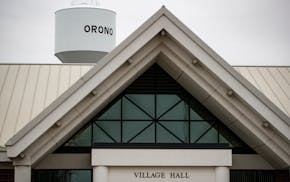Combating crime in St. Paul's Hamline-Midway neighborhood is the job of St. Paul Police Western District Chief Stacy Murphy and Commander David McCabe. But the police leaders are among the first to acknowledge they cannot dampen chronic crime — much of it fueled by mental illness and chemical addiction — through arrests alone.
Eye On St. Paul and Star Tribune public safety reporter Kyeland Jackson recently met with Murphy and McCabe to talk about concerns they are hearing from residents and business leaders and the strategies being considered to improve safety and security in the area around Allianz Field.
This interview was edited for length and clarity.
Q: A lot of residents have been taking to social media to express frustration and anxiety about persistent crime in the Hamline-Midway area and what they hope can be done. How would you guys characterize what's going on? Are we past the worst of it?
McCabe: I can't specifically say we're past the worst of it, but I can tell you kind of what we've been doing in that space. That's a very challenging area, because you have the intersection of Snelling Avenue, a state highway, and University Avenue with the light rail. A lot of people are moving in and out of that space. We also recognize the fact that there are four neighborhoods surrounding that same intersection.
One thing we've done over the summer is we worked with [Department of Safety and Inspections] to focus on the CVS property. This isn't a place for people to hang out, camp, things like that. We're able to go in, interact with individuals and determine if this is somebody that needs extra resources. Is this somebody that has a warrant and maybe needs to go to jail? Is this somebody that, you know, is simply just trespassing or can we address this issue with a ticket? And, in conjunction with [Metro] Transit, we focused on the [light rail] platforms.
We kind of looked at it from multiple tiers and it got significantly better than what we saw in July. And we're continuing to spread out into the four neighborhoods because, as we focus on one area, people move to different spots.
Q: Talk about what you're doing.
Murphy: One of the things that we're doing is working very closely with our community and city partners. There are a number of different community groups that are very active, and they're very good about working with us, giving us information and where some of the issues have moved to.
We know our city partners — the Office of Neighborhood Safety, the Department of Safety and Inspections, Public Works, Parks and Rec — and everybody has been helping to do their piece of the puzzle. It isn't just about enforcement, because that just kind of pushes people other places. And we can't arrest yourself out of any problem.
So, Ramsey County Mental Health is getting folks resources, if they're unsheltered individuals that are having problems with chemical dependency, things like that. How do we get them connected to the right people? Probably the biggest thing that we're doing is a much broader strategic approach long-term. None of those are quick fixes.
Q: Is it accurate to say that a small number of offenders are committing most of the crime?
Murphy: With violent crime, that's correct. But this is a lot of quality-of-life issues, so a lot of it revolves around mental health, chemical dependency and unsheltered or homeless individuals. So, it's not that it's a super small group of people. To Dave's point, it has a lot to do with the ability for folks to flow through the area. We have light rail now and it's an easy way for people to kind of flow through. It really revolves around mental health, chemical dependencies, and unsheltered individuals.
Q: Is there a particular strategy you can point to and say it's helped?
McCabe: If the business owners are able to communicate to us that there are people trespassing here, it gives us the legal ability to go on private property and interact with these individuals. We have a phenomenal relationship with the Hamline-Midway district council, as well as some of the building owners and some of the major property owners in that area. We've had some very good discussions.
Murphy: Through the Office of Neighborhood Safety, we have a group called 21 Days of Peace. Last year, they did a ton of work, a lot of it over on the East Side. Last week was their first week back out, spending a lot of time over in the West. They'll go wherever we need them. They can spend a lot more time than the police in a location, such as Snelling and University.
They can go to these pockets. Get to know the individuals. They figure out what resources they need. They're very, very good at that one-on-one type of communication. And they're a very compassionate group of people that want to help all of these folks. So that's one other strategy that I think is going to be very helpful.
McCabe: I live in St Paul. We call it St. Small, right? St. Paul is a city of neighborhoods, and each neighborhood is unique. Each neighborhood has its challenges or needs. So, it's about taking our resources and allocating them. When we look at specific projects, we look at the big picture.
We do this for a couple of weeks and now let's go over to this area and do it for a couple of weeks. If we squeeze the balloon here, you know, we want to squeeze the balloon over there, too. Use 21 Days of Peace and the Office of Neighborhood Safety to make sure that balloon doesn't pop up again.
Arson caused fire that engulfed WWII buildings in Arden Hills, fire department says
Body of canoer found in Boundary Waters

Pope Leo XIV calls for peace in Ukraine and Gaza in symbolically rich blessing on Mother's Day

